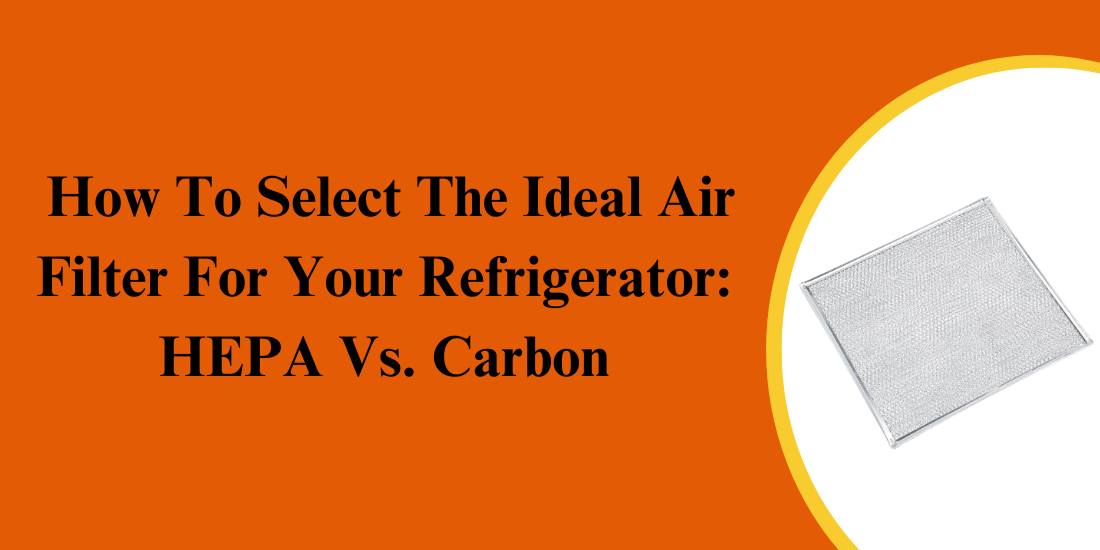
In a commercial kitchen, keeping the refrigerator in good working order is particularly crucial. The quality of the ingredients is influenced by more than just temperature; the air within the refrigerator also has an impact. The right air filter can help eliminate particles, neutralize smells and even preserve the freshness of the food. In this article, we will be discussing two types of air filters used in commercial kitchens, namely HEPA filters and Carbon filters, and which one is best for your refrigerator.
Understanding Air Filters and Their Role in Refrigerators
Air filters are designed to improve the overall air quality inside the refrigerator. By trapping harmful particles, such as dust, bacteria, and odors, air filters help create a cleaner environment. This keeps food from becoming contaminated or spoiling, in addition to preserving its freshness.
The two primary functions of air filters in refrigerators are:
- Removing Contaminants: Air filters capture particles and pollutants that might be present in the air, ensuring that the atmosphere inside the fridge is clean and conducive to food preservation.
- Controlling Odors: Odor control is a crucial factor, especially in refrigerators where strong-smelling ingredients are stored. A good air filter will eliminate or neutralize undesirable smells, preventing them from affecting other foods.
Key Differences Between HEPA and Carbon Filters
To help you make an informed decision, we’ve summarized the key differences between HEPA filters and Carbon filters in the table below:
Feature |
HEPA Filter |
Carbon Filter |
| Primary Function | Captures particles, dust, bacteria, and allergens | Absorbs odors, gases, and volatile organic compounds (VOCs) |
| Particle Size Removal | Captures particles as small as 0.3 microns | Does not capture particulate matter, focuses on gases |
| Effectiveness | 99.97% efficient at trapping airborne particles | Highly effective at removing odors and gases |
| Maintenance | Requires regular cleaning or replacement as particles accumulate | Needs periodic replacement when adsorption capacity is exhausted |
| Ideal For | Environments where particulate contamination is a concern (dust, mold, bacteria) | Environments where odor control is a priority (fish, garlic, strong-smelling foods) |
| Food Safety | Improves overall food safety by reducing bacteria and allergens | Does not impact food safety directly, but helps maintain food quality by removing odors |
| Limitations | Does not address odor control | Does not filter out airborne particles, only gases and odors |
| Common Use Cases | Refrigerators storing sensitive items like produce, meats, and dairy | Refrigerators with strong-smelling ingredients or mixed food storage environments |
HEPA vs. Carbon Filters: Which One Should You Choose?
Here’s how to determine which one is best suited for your commercial refrigerator:
1. Air Quality Needs
- HEPA Filters: Best for environments needing protection from dust, mold, and bacteria.
- Carbon Filters: Ideal for controlling persistent odors from ingredients like fish, onions, or garlic.
2.Types of Food Stored
- HEPA Filters: Perfect for storing perishable items like fresh produce, meats, or dairy.
- Carbon Filters: Great for preventing odor transfer in strong-smelling foods such as fish or cheese.
3.Maintenance Requirements
- HEPA Filters: Require more frequent cleaning or replacement due to dust accumulation.
- Carbon Filters: Need replacement when they no longer absorb odors, with less frequent maintenance.
4.Combination Filters
In some cases, using a combination filter that features both HEPA and Carbon filtration can provide the best of both worlds. These hybrid filters are designed to tackle both particulate contamination and odor control.
The necessities of your kitchen will determine which air filter is best for your commercial refrigerator. If both particle removal and odor control are necessary, consider a combination filter. Regular air filter replacement and timely maintenance are key to ensuring optimal refrigerator performance, food safety, and extended ingredient shelf life.
Written by Allen Rode for PartsFeCa, your trusted source for a variety of high-quality commercial restaurant equipment, including Refrigerator, and oven parts.







